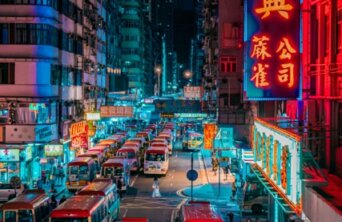- About
- Topics
- Picks
- Audio
- Story
- In-Depth
- Opinion
- News
- Donate
- Signup for our newsletterOur Editors' Best Picks.Send
Read, Debate: Engage.
| topic: | Human Rights |
|---|---|
| located: | Hong Kong |
| editor: | Nicole Wong |
Half a year after his release from prison and after continuous monitoring by the National Security Department of the Hong Kong Police Force, 22-year-old pro-democracy activist Tony Chung from Hong Kong announced his arrival in the UK to seek asylum, breaching the one-year supervision order. "After my release from Tai Lam Correctional Institution [...] the [national security police officers] appeared to caution me and inquire whether I would continue to participate in events related to secession," wrote Chung on Facebook.
Chung's statement marks his first public address since his release from jail, underscoring a broader pattern of Hong Kong dissidents living in fear due to state surveillance and growing unease over increased departmental oversight.
"The national security police officers began requesting meetings every two to four weeks, leaving me with no option but to comply," he continued. Chung mentioned national security police were trying to get involved and control his personal life, as he needed to report his whereabouts in detail.
The young activist said he suffered from tremendous pressure and fear during the period. 'In the past six months, with no income from any work, the national security police officers kept on coercing and inducing me to join them," He wrote. "My speculation is that they have learnt about my financial struggles through my bank account information, so they proposed providing informant fees, urging me to supply information about others as proof of my reformation and willingness to cooperate."
Chung is not the first one to express worries about personal safety concerns causing mental and physical health problems. Earlier last month, a high-profile pro-democracy activist, Agnes Chow, claimed she decided to skip her trial after posting bail and said she would not return to HK. She, like Chung, was invited to visit mainland China under the department's "patriotic brainwashing education" program, which includes a visit to an exhibition showcasing China's achievements.
Since the establishment of the controversial Hong Kong National Security Law, political activists who feel unsafe and threatened have been fleeing to other countries. Statistics from UNHCR indicate a significant upward trend in the annual number of asylum-seekers from Hong Kong, from 222 in 2019 to 985 in 2022.
When asked about Chung's asylum request by the BBC, Hong Kong Police stated that certain individuals who had committed crimes that endangered national security had violated their bail or supervision orders by leaving the city, resulting in a breach of trust and integrity.
"Not only have they failed to reflect on the harms they have caused to Hong Kong and members of the public, but they have also shamefully begged for assistance from foreign anti-China forces under the guise of being victims," the force added.
Thomas Kellogg, the executive director of the Georgetown Center for Asian Law, said in an interview with the New York Times that the expansion of informal supervision over ex-prisoners showed Hong Kong's security police have at least partly duplicated what the mainland Chinese authorities are doing.
During a media interview, researcher Patrick Poon emphasized that even if activists were to seek refuge in other countries, they might still face intimidation in the future, akin to the experiences of Uyghurs living abroad who receive calls from national security police.
With the upcoming legislation for Article 23 of the Basic Law addressing the seven security-related crimes, it is assumed that the Hong Kong authority will expand its power to control activists in the foreseeable future and adopt more tactics from mainland China to ensure complete surveillance of activists in the name of national security.
Photo by Chi Hung Wong.

